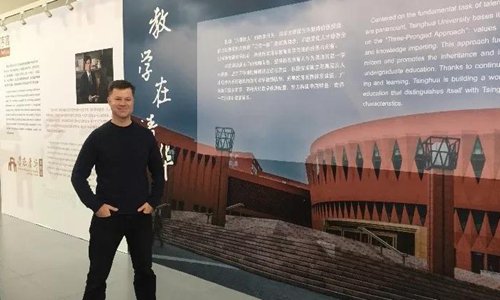HOME >> CHINA
China-US academic ties continue despite visa woes
By Xu Keyue and Leng Shumei Source:Global Times Published: 2019/6/13 17:29:18
Elite colleges voice support for exchanges

A picture of David P. Zupko Photo: Official Sina Weibo account of Tsinghua University
Academic exchanges between China and the US are continuing smoothly amid worries that the US government's tightened visa restrictions and increased scrutiny of Chinese students and scholars may cast a shadow over the two sides' long-held positive interactions.
Interviews with some joint China-US colleges and institutes operating in China show that their projects are moving forward as usual.
"All academic communication activities are continuing normally," an employee of the administration office of the Tsinghua-Berkeley Shenzhen Institute (TBSI), which was established in Shenzhen in 2015 by Tsinghua University and the University of California (UC), Berkeley, told the Global Times on Tuesday. UC Berkeley is among a number of US colleges and education institutes to have issued statements in support of Chinese and other international students and scholars amid the ongoing trade war.
Wuhan University (WHU) in Central China's Hubei Province announced on its website that it and the University of Pennsylvania would launch their second academic communication project this summer at the University of Pennsylvania.
Through a widely-followed WeChat account that shares lectures and communication activities at Beijing-based universities, the Global Times found that many US scholars and university teachers are giving lectures every week at some top Chinese universities in Beijing, including Peking University (PKU) and Tsinghua University.
For example, Kaiji Chen, an associate professor at Emory University in the US, gave a lecture on Tuesday titled "Aggregate and Distributional Impacts of Housing Policy: China's Experiment" at PKU, despite reports claiming that Emory had reportedly fired two Chinese-American professors - Li Xiaojiang and his wife Li Shihua - for failing to disclose ties to China in May.
The Tsinghua University global cooperation and communication office announced Wednesday on its WeChat account that David P. Zupko, an American professor, was appointed vice director of the office in June, the first foreigner to be appointed to the university office at the level of vice director since China's opening-up in 1978.
The employee from Tsinghua-Berkeley Shenzhen Institute (TBSI) said some professors from UC Berkeley would come to Shenzhen and attend an academic exchange seminar in July.
Open attitude
On June 3 in Beijing, China's Ministry of Education (MOE) issued a warning of the risk of applying to study in the US, but the ministry said that despite the ongoing friction between China and the US, there is still a steady flow of Chinese students applying to study in the US, and American universities have an open attitude toward exchanges and cooperation with China and they welcome Chinese students.
In light of the MOE's warning, Northwestern University, in the US state of Illionois, released a statement on its website on June 7 saying that it is committed to assisting Chinese students with the visa process. The university also said that they will hold pre-departure orientations in Beijing, Shanghai and Guangzhou in mid-June.
"Only mutual understanding can reduce conflicts," K.J. Turner, an overseas student from the US who is now studying at PKU, told the Global Times on Tuesday. PKU will hold a one-month summer course on social science in July in cooperation with the University of Michigan, the 13th time the course has been offered.
A student surnamed Zhang, who was going to the University of Hawaii System for a one-year exchange in August, told the Global Times that she did not feel any apparent influence over what she plans to research. "I think the key is still my research plan."
Analysts slammed the US for politicizing academic exchanges and called on Washington to stop unilateral restrictions and the politicizing of normal academic interactions.
"Open academic communication is a good thing," Huang Wenzheng, a Chinese demographics expert and former Harvard University assistant professor, told the Global Times on Tuesday.
"Both sides will suffer great losses in the academe and technology, even society development, if political considerations disturb normal academic communications," Huang said.
Roger T. Ames, a humanities chair professor from the US at the Department of Philosophy, Peking University, told the Global Times by email on Tuesday that "all avenues of academic communication should be kept open."
China ranks first among the places of origin of international students in the US, according to the 2018 Open Doors report of the US-based Institute of International Education.
More than 363,300 Chinese students were registered in US colleges and universities for the 2017-2018 school year, making up 33.2 percent of international students, the report said.
Media reported that Chinese students contribute nearly $13 billion annually to the US economy.